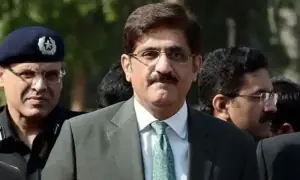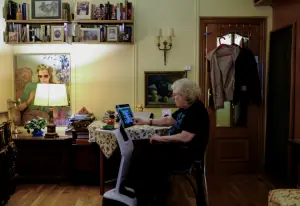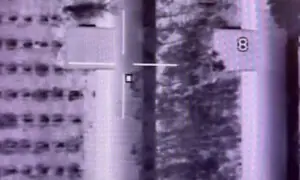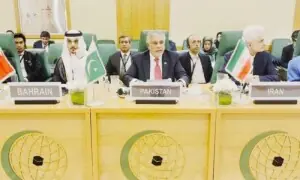Rise in dissenting notes may have link to Justice Isa case
6 min readSpeculation was rife when a detailed dissenting note of two Supreme Court judges was released on Monday. But a senior journalist believes disagreements among jurists began after the Justice Qazi Faez Isa case.
“The judges were in two camps,” journalist Hasnat Malik said at Asma Shirazi’s show Faisla Aap Ka. He had joined to speak on the note that challenged the “one-man show” enjoyed by the office of the chief justice of Pakistan.
The Supreme Court threw out the presidential reference against Justice Qazi Faez Isa, describing it as “tainted with mala fide in law”. The majority (9-1) short verdict had quashed it and declared it to be of no legal effect.
Malik, who covers court for The Express Tribune, was answering the query of whether the judgement was prompt or trouble was brewing up and waiting to come as a bombshell.
One section out of the two camps, he said was of the view that Justice Isa should respond and the matter was sent to the FBR while another section thought, which turned out to be in majority, said it was malafide as the way reference was filed. There was also a debate during the hearing on the judges sitting for a review petition, the journalist said, beginning the trend of questioning each other.
According to Malik, the unlimited power of the CJP was the bone of contention. This prerogative includes the composition of a bench to hear cases and the power to take suo motu notice.
CJP Justice Umar Ata Bandial took suo motu notice of the polls in Punjab and Khyber Pakhtunkhwa on February 22. He also constituted a nine-member bench to hear the case, however, he split the larger bench into a five-member bench on February 27.
In the past as well, “like-minded” judges have been picked to hear cases. But senior puisne judge Justice Isa and Justice Sardar Tariq Masood have not been made part of any high-profile political case, Malik said while some judges have been part of more than 70 cases over the past five years.
“So this discrepancy or disparity or discrimination has become more obvious now,” he said.
When asked if a full court bench would solve the issue of elections, Malik said the final authority in the apex court lied with the CJP. The journalist was not of the view of such a possibility as CJP Bandial had defended his bench amid criticism.
He shared that independent lawyers, who are not associated with any political party, have called for a full court bench in prevailing times.
“Court decisions are set on moral authority, which has been eroded,” he said while mentioning the note that questioned the judgement. Under what authority the court can summon the prime minister or the Election Commission of Pakistan when their own judges were questioning them, he added.
When the host shared that the judge has advised political parties to sit together to end polarisation, he said this raises the question of why not judges sit together.
“I think it will be very difficult for the judges as quarters concerned are divided as they were at the time of Panama [the case that left former prime minister Nawaz Sharif disqualified]. In the next two to three days it will be obvious whether the decision will be applied or not,” Malik said.
Minority judgement ‘has no value’
Justice (retd) Shaiq Usmani was of the view that what the CJP said was right and disagreements among judges always remain.
“They have the right to oppose it and write it, earlier they gave brief judgements and now the detailed judgement is given,” Usmani said, who had also joined the Aaj News show to speak on the development in the top court.
When asked if the dissent note given by Justice Athar Minallah and Justice Yahya Afridi was part of the four in which Justice Mansoor Ali Shah is giving reference in his decision, he said no as they had recused from being part of the bench.
Their view of whether they are right or wrong was a separate debate, Justice (retd) Usmani said. He suggested if a change was supposed to bring it should be done on the power of suo motu notice
It will not be done by judges, he said and added for this Parliament has to do legislation or SC rules have to be changed. “Until the present rules are present, the constitution of the bench is the responsibility of the CJP.”
He went on to add that there was nothing like an “ethical position” on the note as the ruling given by late Peshawar High Court Chief Justice Waqar Ahmad Seth in the case against late military ruler retired Gen Pervez Musharraf was a “minority judgement”.
“We direct the law enforcement agencies to strive their level best to apprehend the fugitive/convict [Pervez Musharraf] and to ensure that the punishment is inflicted as per law and if found dead, his corpse be dragged to the D-Chowk [in front of the Parliament House], Islamabad, Pakistan, and be hanged for three days,” Justice Seth had written.
“Minority judgement never has any value, it has an academic value in a sense when it is studied for example, when there is a debate and a judgement goes to Parliament it can be quoted then,” Justice Usman said.
Abbasi calls for sitting together, truth commission
PML-N leader Shahid Khaqan Abbasi, the third guest on the show, was shown an old speech of PPP Chairman Bilawal Bhutto Zardari on the floor of the National Assembly in which he called for forming a joint committee to alter the powers of CJP.
Abbasi was of the view that it has to be seen how Parliament can act. “I think if the SC side down legislation then Parliament should assert as it is their domain. This has encroached to a great extent, this should end,” he said and suggested that the apex court should see its conduct in the past.
He demanded that the CJP should take notice.
The PML-N leader stressed the need for correcting the course right from the verdict that disqualified former premier Nawaz Sharif in the Panama case.
“Our narrative is not against judge but their conduct,” he said when the host asked the PML-N had expressed concerns over the judges.
He called for forming a truth commission to present facts in front of people in order to learn from them. “We are bearing the brunt of what happened in the 2018 elections under the supervision of [former army chief] Gen Bajwa,” he claimed.
The PML-N leader rebuffed an impression that there was any political discussion with Nawaz in London where he was on a “private visit”.
“We have an old relationship. Nawaz will himself make a decision on return. He believes matters will not move forward if you rectify the mistakes that brought Pakistan today here,” Abbasi said, “the talks linked to Bajwa are self-incrimination. This is evidence against himself. I suggest he should speak carefully.”
He rebuffed that the party was afraid of elections.
Abbasi stressed the need for resolving issues by sitting together and chalking out a solution.
“Your intent cannot be created via legislation. When your intent and thinking is to resolve issues then a way is there. You have to change thinking and everyone has to participate,” Abbasi said.
For the latest news, follow us on Twitter @Aaj_Urdu. We are also on Facebook, Instagram and YouTube.





















Comments are closed on this story.